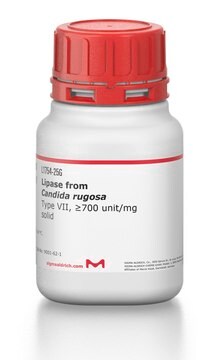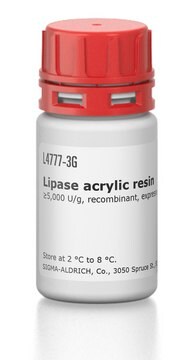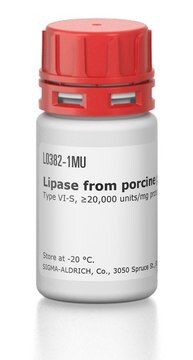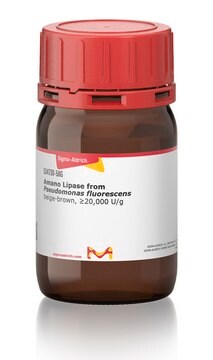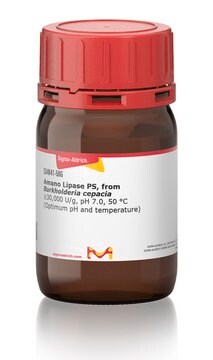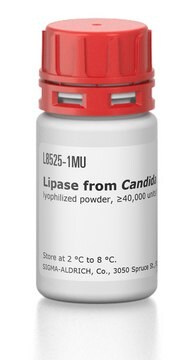About This Item
Polecane produkty
temp. przechowywania
2-8°C
Poziom jakości
Komponenty
Composition:
62301 Lipase from Aspergillus niger, 100 mg
62288 Lipase B Candida antarctica, recombinant from Aspergillus oryzae, 50 mg
62316 Lipase from Candida rugosa, 1000 mg
62298 Lipase from Mucor miehei, 100 mg
62309 Lipase from Pseudomonas cepacia, 100 mg
89601 Lipase from Pseudomonas fluorescens, 200 mg
62305 Lipase from Rhizopus arrhizus, 1000 mg
62310 Lipase from Rhizopus niveus, 1000 mg
L3126 Lipase from porcine pancreas, 1000 mg
62301 Lipase from Aspergillus niger, 100 mg
62288 Lipase B Candida antarctica, recombinant from Aspergillus oryzae, 50 mg
62316 Lipase from Candida rugosa, 1000 mg
62298 Lipase from Mucor miehei, 100 mg
62309 Lipase from Pseudomonas cepacia, 100 mg
89601 Lipase from Pseudomonas fluorescens, 200 mg
62305 Lipase from Rhizopus arrhizus, 1000 mg
62310 Lipase from Rhizopus niveus, 1000 mg
L3126 Lipase from porcine pancreas, 1000 mg
Ta strona może zawierać tekst przetłumaczony maszynowo.
Hasło ostrzegawcze
Danger
Zwroty wskazujące rodzaj zagrożenia
Zwroty wskazujące środki ostrożności
Klasyfikacja zagrożeń
Resp. Sens. 1
Kod klasy składowania
10 - Combustible liquids
Temperatura zapłonu (°F)
Not applicable
Temperatura zapłonu (°C)
Not applicable
Wybierz jedną z najnowszych wersji:
Masz już ten produkt?
Dokumenty związane z niedawno zakupionymi produktami zostały zamieszczone w Bibliotece dokumentów.
Jon C Henrikson et al.
Toxicon : official journal of the International Society on Toxinology, 55(7), 1396-1404 (2010-02-27)
Within the last two decades, Prymnesium parvum (golden algae) has rapidly spread into inland waterways across the southern portion of North America and this organism has now appeared in more northerly distributed watersheds. In its wake, golden algae blooms have
Nasz zespół naukowców ma doświadczenie we wszystkich obszarach badań, w tym w naukach przyrodniczych, materiałoznawstwie, syntezie chemicznej, chromatografii, analityce i wielu innych dziedzinach.
Skontaktuj się z zespołem ds. pomocy technicznej